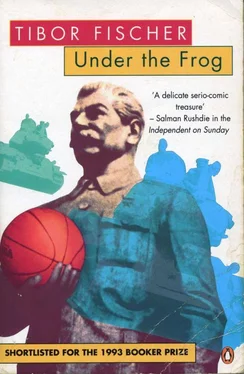Tibor Fischer - Under the Frog
Здесь есть возможность читать онлайн «Tibor Fischer - Under the Frog» весь текст электронной книги совершенно бесплатно (целиком полную версию без сокращений). В некоторых случаях можно слушать аудио, скачать через торрент в формате fb2 и присутствует краткое содержание. Жанр: Современная проза, на английском языке. Описание произведения, (предисловие) а так же отзывы посетителей доступны на портале библиотеки ЛибКат.
- Название:Under the Frog
- Автор:
- Жанр:
- Год:неизвестен
- ISBN:нет данных
- Рейтинг книги:3 / 5. Голосов: 1
-
Избранное:Добавить в избранное
- Отзывы:
-
Ваша оценка:
- 60
- 1
- 2
- 3
- 4
- 5
Under the Frog: краткое содержание, описание и аннотация
Предлагаем к чтению аннотацию, описание, краткое содержание или предисловие (зависит от того, что написал сам автор книги «Under the Frog»). Если вы не нашли необходимую информацию о книге — напишите в комментариях, мы постараемся отыскать её.
Shortlisted for Booker Prize 1993
Set in post-war Hungary between 1944 and 1956, this ferociously funny and bitterly sad story follows the fortunes of two young men in the pursuit of sex and the avoidance of work and army service. They survive the chaos of communism by becoming part of a travelling basketball team.
Under the Frog — читать онлайн бесплатно полную книгу (весь текст) целиком
Ниже представлен текст книги, разбитый по страницам. Система сохранения места последней прочитанной страницы, позволяет с удобством читать онлайн бесплатно книгу «Under the Frog», без необходимости каждый раз заново искать на чём Вы остановились. Поставьте закладку, и сможете в любой момент перейти на страницу, на которой закончили чтение.
Интервал:
Закладка:
‘What would you like me to say?’ inquired Ladányi politely, keeping a spoon full of ice cream from its destination. The whole village was craning forward now, as Faragó was visibly floundering, gazing with resentment at his bowl of ice cream.
‘As the saying goes,’ said Faragó fighting for air, ‘there isn’t room for two bagpipe players in the same inn. We, the working class… we, the instrument of the international proletariat… we will defend the gains of the people…’ Here Faragó jammed, fell off his chair and as if gagging on his propaganda, spilled his stomach on the floor. It looked very much to Gyuri like a job for the last rites.
Ladányi didn’t seemed worried. ‘There are some documents Father Orso has ready for you to sign, I believe,’ he said. The village priest crouched down and offered a pen to Faragó who was sprawled on the floor as if he were thinking about doing a push-up. Saturninely he scrawled a mark on the paper, and, supine, was lugged out inexpertly by the rest of the party cell, limbs lolling.
During their post-micturition conversation, the elderly peasant had also told Gyuri: ‘Take the most rotten individual imaginable and there will always be someone, usually very stupid, but not always, who’ll say no, no, he’s simply misunderstood. Misquoted. Even with murderers, when they write about them in the newspapers, they have a wife or a mother who says he’s not bad, he’s a lovely boy when you get to know him. You ask anyone here to say anything in favour of Faragó; ask people who’ve known him all their lives to say one thing to his credit, just one courtesy, one thank you, one favour – you’ll find the people of this village as quiet as melons in long grass. His own mother, if Faragó was waiting to be executed, would only say things like “Make that noose tighter” or “Is it permissible to tip the hangman?’”
Wiping his mouth with an embroidered napkin, Ladányi stood up briskly as if he had been having a quick snack between important engagements. ‘Well, we have to go now. God bless you all.’ Another hour of hand-kissing and loading up gifts onto the cart followed, but Ladányi resolutely insisted that they should depart since they had an opportunity of catching a train which would get them to Budapest in the morning.
By moonlight, Ladányi looked remarkably thin. Gyuri felt somewhat queasy during the bumpy cart-ride and he was astonished that Ladányi didn’t have any inclination to deswallow. It would be months, Gyuri was convinced, before he would want to eat again. Neumann broke the peregrinational hush: ‘Does that agreement really mean anything? Forgive me for saying so but Faragó looks as if he would roger his grandmother for the price of a drink, or even for free.’
‘Look,’ replied Ladányi, ‘what we did tonight was to act out a morality play. I was asked to come. I couldn’t refuse. I doubt if it will make any difference, not because of Comrade Faragó being probity-free, but because of everything else in the country. This was one night of miniature victory in what will be long years of defeat. I hope it will have some importance for the people in Hálás.’
‘How long do you think this will last?’ asked Gyuri, not sure that he actually wanted to hear the answer.
‘Not long,’ pronounced Ladányi. ‘I’d say about forty years or so. You have to wait for the barbarians to get old, to become soft barbarians.’
This wasn’t an answer Gyuri wanted to hear, particularly coming from Ladányi. ‘Time to leave the country.’
‘Not at all. Firstly, as I’m sure you know, it’s not easy to get out any more, and secondly, and I should point out this is not an idea patented by the Church, matter doesn’t matter. It’s not physical conditions that count, but your opinion of them. Take the farmer in the small village in the middle of China who is the happiest man in the world because he has two pigs and no one else in the village has got one. Living isn’t like basketball, it’s not a question of points, but what’s here.’ Gyuri saw Ladányi touch his forehead with his forefinger. ‘You only lose if you give up- and if you give up you deserve to lose. In basketball, you can be beaten. Otherwise you can only be beaten if you agree to it. You’re lucky, you’re very lucky. We’re living in testing circumstances; unless you’re very dull, you should want to be stretched.’
Thanks for the totalitarianism, Stalin. Gyuri doubted that he would enjoy a prison cell as much as Ladányi. ‘A ticket to Paris would be more fun,’ he retorted ‘Couldn’t I book a few prayers for that?’
‘I’ll be delighted to forward your request, but don’t be too specific, or you might get it. One should pray for the best. Maybe you’ll be happier here than in Paris.’
‘I’m prepared to take that risk. Anything to escape from record-breaking lathe-operators.’
‘Yes, this cult of the worker is a bit wearing. Ironic that it sprang chiefly from a fat, free-loading German academic who never had a job in his life, but just sponged off his acquaintances and who indulged in such very bourgeois practices as impregnating the chamber-maid. And so boring. People often overlook the work of a poor carpenter who chose fishermen as his company.’
They rattled on in the cart for a while.
‘The greatest irony about Marx’s influence is that his books are unreadable,’ Ladányi mused. ‘Perhaps his appeal lies in his unintelligibility, a sort of mysticism through statistics and the wages of textile workers. People will have a good laugh about it one day. But, unfortunately, there are people who believe it, not the ones who’ve joined now, but those who joined before the war, when the movement was illegal. They believe in it and as Church history amply shows crazy ideas can take a long time to die out.’
‘I think it’s a process I’d like to watch closely from a café in New York. I might even find it funny from that distance.’
‘Me too,’ chorused Neumann.
‘The desire to travel is part of your age. You’ve never been out of Hungary, have you? Be careful, people can become very fond of their prisons, you know.’
They arrived at the station in the nick of time to catch the train back to Budapest. Neumann, who had the priceless gift of being able to sleep on trains, bedded down in another compartment on some unclaimed seats, while Ladányi took out a book – the Analects of Confucius. ‘Is it any good?’ Gyuri questioned. ‘Life is too short for good books,’ said Ladányi, ‘one should only read great books.’ ‘How can you tell if it’s great?’ ‘If it’s been around for a couple of thousand years, that’s usually a good sign. This isn’t bad. Some of us younger ones have been told to study Chinese. Our superiors think it’s a growing market. Every year a Jesuit gets a letter containing his orders. I have a feeling they may be getting us out of the country. I think that’s wrong, but that’s where the vow of obedience comes in.’
Gyuri hadn’t been to church since he was fourteen when his mother dragged him to the Easter Mass. Naturally, he had attempted to get in touch with God on several subsequent occasions when he had thought he was going to die but always on the spot, away from church precincts. This was surely the real boon of a religious upbringing: it gave you a number to ring in emergencies, which was some consolation, even if no one answered. Gyuri had met with the various arguments for God’s existence from his partisans, proof through design (‘that’s what I call a well-made universe’), the craftsmanship of the universe (it did seem to be an awful lot of trouble for a practical joke) or Pascal’s way of looking at it, a hundred francs on God each way. But, all in all, the best argument he had come across for taking Jesus’s shilling was that the sharpest razor, Ladányi believed it.
Читать дальшеИнтервал:
Закладка:
Похожие книги на «Under the Frog»
Представляем Вашему вниманию похожие книги на «Under the Frog» списком для выбора. Мы отобрали схожую по названию и смыслу литературу в надежде предоставить читателям больше вариантов отыскать новые, интересные, ещё непрочитанные произведения.
Обсуждение, отзывы о книге «Under the Frog» и просто собственные мнения читателей. Оставьте ваши комментарии, напишите, что Вы думаете о произведении, его смысле или главных героях. Укажите что конкретно понравилось, а что нет, и почему Вы так считаете.












